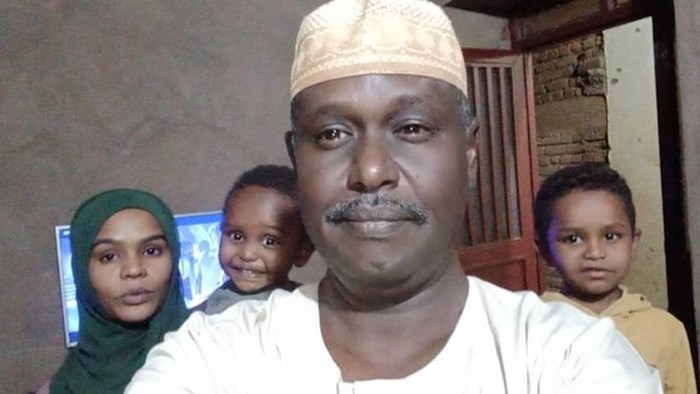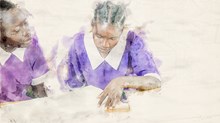I Pray for Peace: A World Vision Staffer Reports From Sudan

Christian humanitarian organization World Vision has worked in Sudan for more than 36 years but has temporarily suspended operations while fighting rages. Using only his first name for safety reasons, we hear from staffer Gamal, who is currently sheltering at home with his family in the capital city of Khartoum. He describes life since the fighting erupted.
Every day we are under fire. Planes bomb the area where I live with my family. We are seeing people moving from other areas of Khartoum into the houses of relatives. And here people are moving away to live with relatives in other states. We don't know where the shooting will come from, and all types of weapons are being used.
I'm living with my wife and two sons, ages 5 and 2. My two sisters, one with two young sons, are also living with us. Each day I try to keep my children busy so they do not feel that they are at risk or in danger. I divide my time between helping them learn and playing with them. We need to help our children live as normal as possible and keep them away from seeing the news that consists of violence. I chat with them, they watch children's programs on television, and when they ask why we do not go out, I say, “I’m here at home to be with you.”
I am doing my best to make them feel that there is nothing strange–but it’s not working. I've told my oldest son, when he asks, that there is fighting between two military forces. I try not to lie to him. Until now it's been like a game for them; they are not aware of the risks they face.
When the fighting erupted on April 15, I was at my son’s kindergarten for a graduation party. My wife was at a market in northern Khartoum near where the fighting started when I received a call from a friend telling me about the fighting. I tried to reach my wife, but there was no connectivity. I hurried home.
I had to make sure my family at home was safe, but my main concern was my wife. After two hours, she arrived home shocked. I spent time helping her calm down. She told me that while she was in the market, she heard fighting and explosions and ran. She managed to get into a minibus with other passengers and got away. Normally, it's a 20-minute trip home, but there was a checkpoint and they had to take a longer route. On the way back, she saw military vehicles rushing around the streets. After she arrived home, it took about two days for her to get back to feeling more normal.
Until two days before the conflict, I was in Nyala, about 760 miles away in the south. I think about the situation there, because it's been so bad. All the staff there told me that they are managing, but they are suffering. Food and electricity are gone, and all the stores of the offices of the U.N. and [humanitarian organizations] were looted.
My family can survive for two weeks with the food we have. There is a market not far from us where there is some food, but prices have doubled or tripled, especially rice and potatoes. A kilo of lamb that was once 5,000 Sudanese pounds (US$8.33) is now 10,000 (US$16.67).
When I go to the market, I see people negotiate very hard to get milk for their children. It is rare and expensive, and not many people can buy it. I don’t know how mothers face this challenge. But you also have people selling milk from donkey carts that move around the city.
On April 16th, a day after the conflict broke out, the entire banking system in the country was shut down. As a result, we couldn’t be paid. I’ve had to borrow money from friends. I have many friends, and I was a teacher before I joined World Vision. People are very supportive of each other, even helping strangers with food, water, and shelter. I know one friend; he went to live with his family in another state over 150 miles away. Some people have no relatives outside of Khartoum so they cannot leave. I myself ask: should I stay or leave? If it gets worse, then I may have to leave the city. But we hear stories of carjacking and robbery by armed groups.
As of May 9th, I've heard that more than 90,000 people have left Sudan, but this figure is probably changing every hour. I have a neighbor whom I've seen every day, but he suddenly left his family three days ago.
People think the conflict will not last long. Personally, I think it will take a long time. We hear that around 3,000 people have been injured, and officially, there are over 500 people dead. The real numbers are probably higher than this.
I’m so concerned about how the current fighting is exacerbating Sudan’s already dire humanitarian situation here. Nearly 16 million people—about a third of the population—are dependent on humanitarian assistance. Some 11 million people in the country lack access to clean water and sanitation, 10 million people need basic medical services, and 7 million out-of-school children need education support.
We desperately need peace to be restored. Without it, humanitarian organizations like World Vision can’t help with food and nutritional support for vulnerable children and their families. Unless the fighting stops soon, Sudan will descend into chaos, taking its people along with it.
I pray for peace.
The Better Samaritan is a part of CT's
Blog Forum. Support the work of CT.
Subscribe and get one year free.
The views of the blogger do not necessarily reflect those of Christianity Today.





















